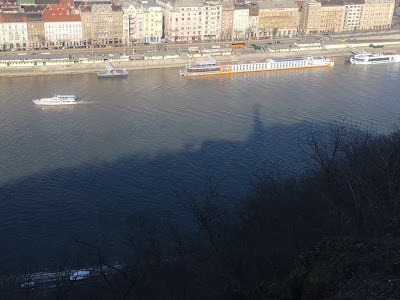 |
Taking in the Danube from atop Gellert. |
We had less than a day in Budapest, so we left our hotel and went for a walk, heading south towards Gellert Hill.
We went along the Danube on the Buda side, strolling beside the river, avoiding
bicyclists, dodging rollerbladers, weaving past tourists stopping to
snap photos of the Hungarian Parliament Building across the river – and pausing
to snap our own. Then under the Chain Bridge, through a
side street, browsing in a small design shop, until finally reaching the foot
of Gellert Hill.
We climbed the switch-backing paths, catching glimpses of the city below, and savouring the spring flowers. We were hungry when we reached the top, but we still lingered to appreciate the view.
Then we walked down the hill, through the park on the backside of Gellert and, without really meaning to, we went to a touristic, Hungarian restaurant.
The restaurant looked traditional. There was a big, old ceramic furnace in the corner and red,table clothes with traditional Great Plains-ish patterns draped atop the tables. Even the waiters seemed authentic – grumpy, old men in white shirts idly walking around and waiting on the three occupied tables, but mostly trying unsuccessfully to look as busy as they could in a not so busy restaurant.
We sat down, ordered our food. My novice food-ordering Hungarian language skills seemed to brighten the grumpy waiter's mood. We even earned a further nod of approval when we ordered a bottle of Kadarka.
When our food arrived – which was delicious, by the way – a traditional Hungarian band was tuning up. Why would a band get ready to play so early? we wondered.
At 6:03pm, they started playing a Hungarian folk tune that sounded familiar from my years spent living above touristy Hungarian restaurants with outdoor bands on Vaci utca. At 6:04pm, a table beside the band abruptly stood up and left while the band played, eliciting an angry, hurt, surprised reaction from the first violinist.
At 6:05pm, a busload of Chinese tourists filed into the restaurant, occupying every spare table. The grumpy old waiters lept into action, taking orders and bringing drinks. As the band played, most of the tourists stared longingly into their phones. Some did talked among themselves. One old lady put her head in their hands and dozed off.
The band started playing the Blue Danube – the 2001 song... the spaceship one, not the bone smashing song, which is not a dinner-eating tune – as the grumpy old waiters hustled from table to table, bringing food to tables filled with filled to delighted tourists. Even the dozing old lady took her head out of her hands.
The familiar tune was treated with indifference. The tourists remained glued to their phones as they ate or poked suspiciously at their nokedli, while the violinist strolled up and down the aisles, playing his violin solo.
The familiar tune was treated with indifference. The tourists remained glued to their phones as they ate or poked suspiciously at their nokedli, while the violinist strolled up and down the aisles, playing his violin solo.
The dessert was served and the the band took a break. They smoked outside and sipped water at the bar. While the grumpy old waiters to carried away the plates, we drained our wine, settled our bill – which brightened our grumpy waiter's mood – and walked into Budapest's gathering dusk.


